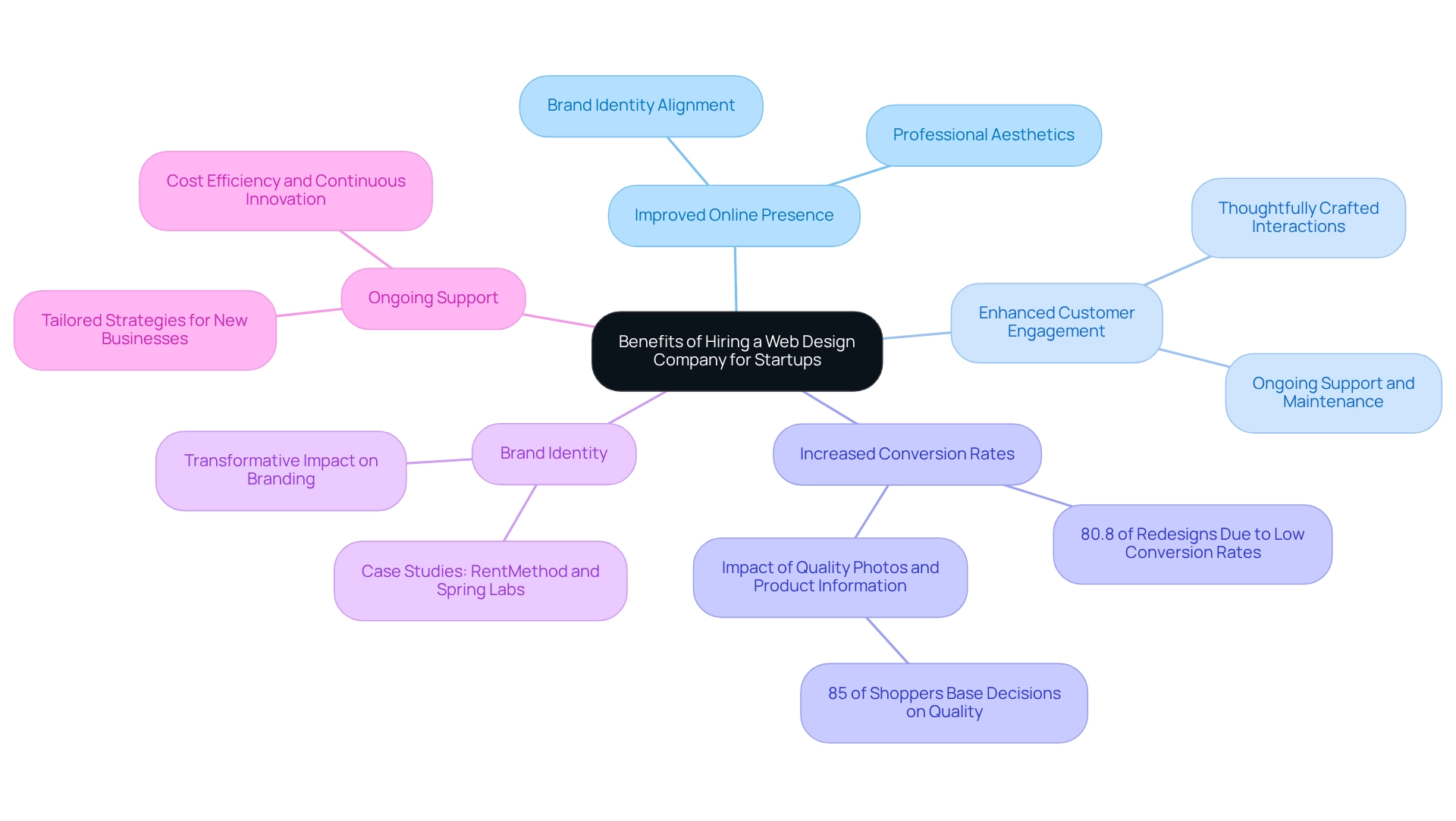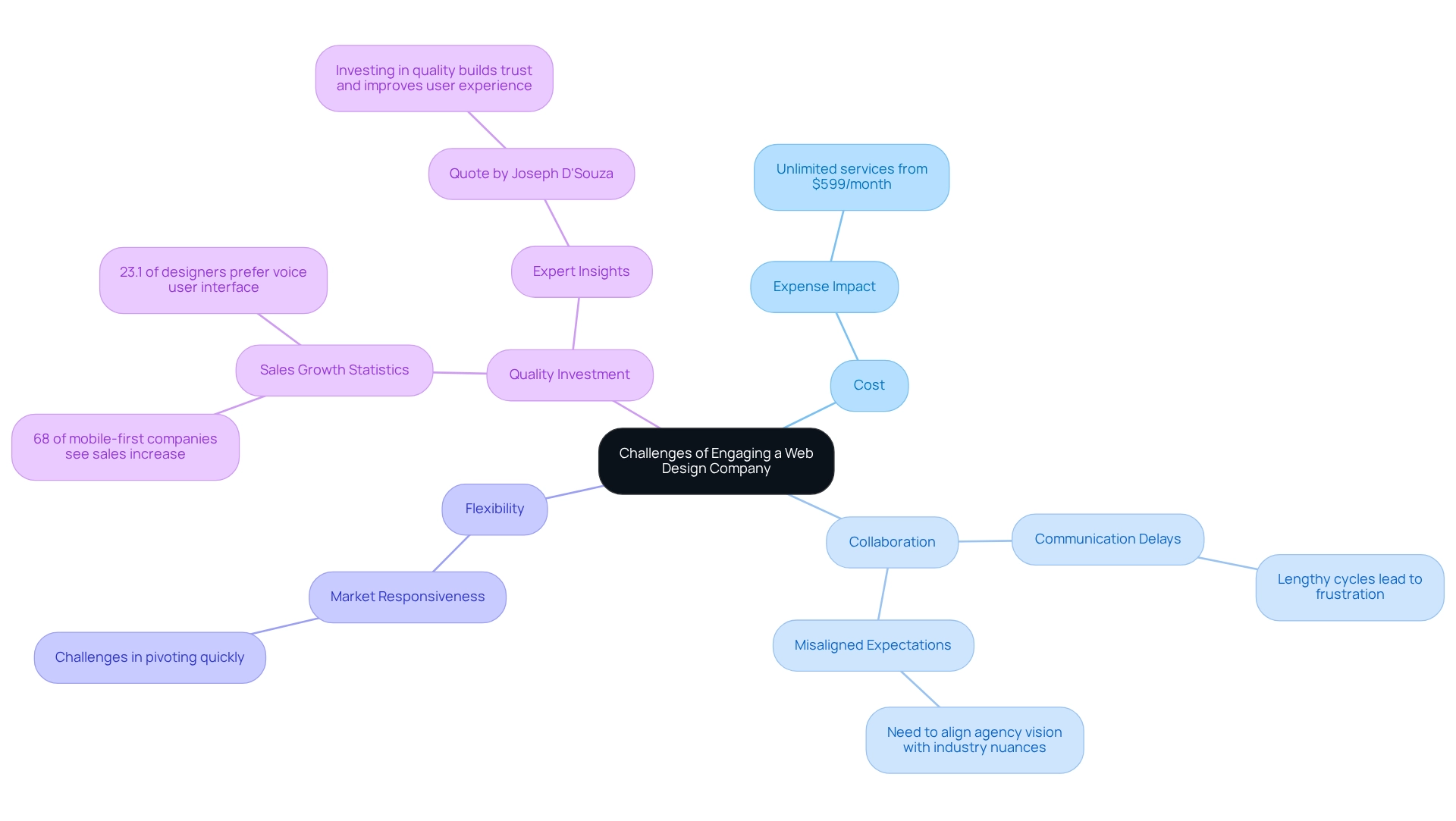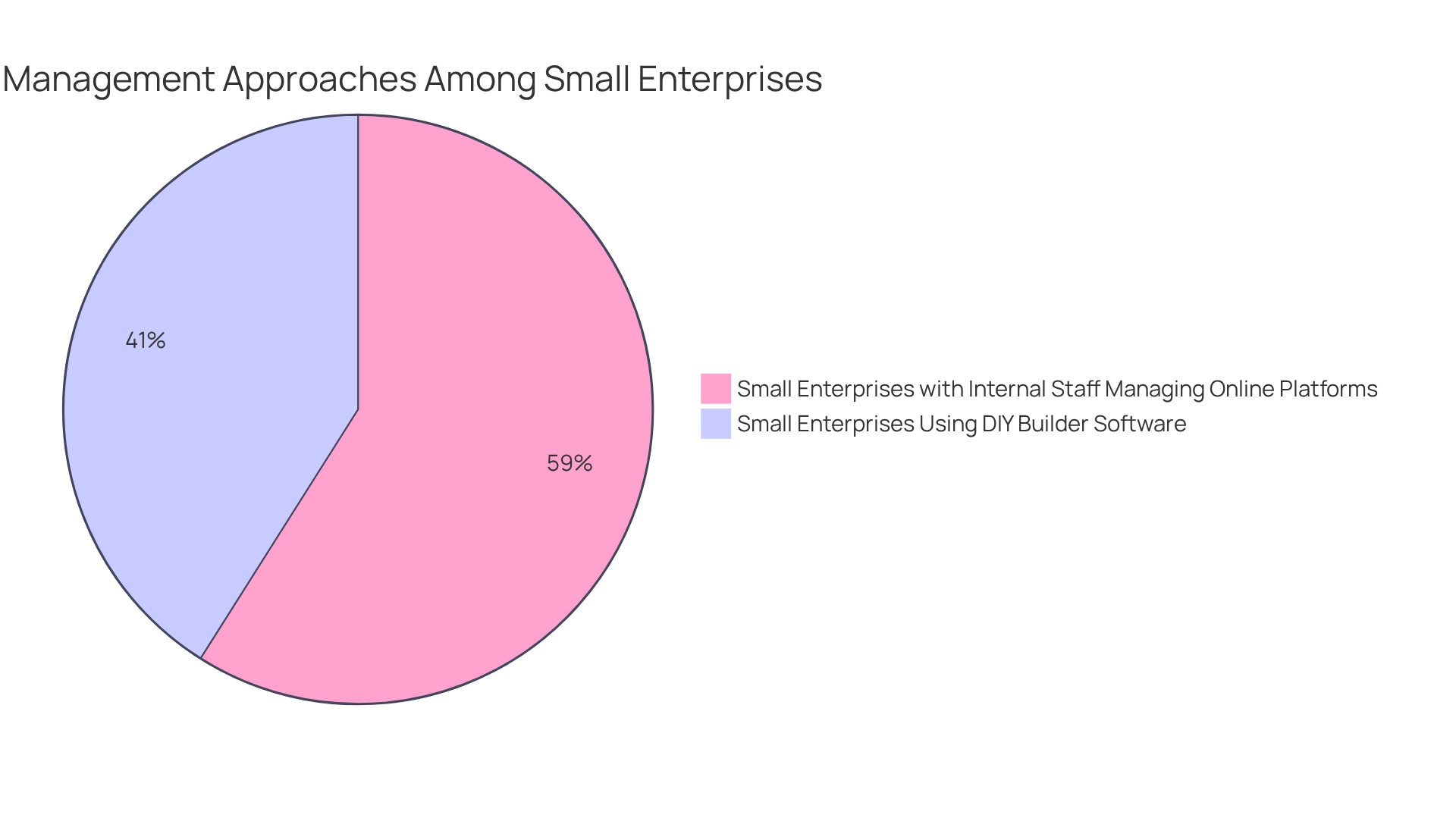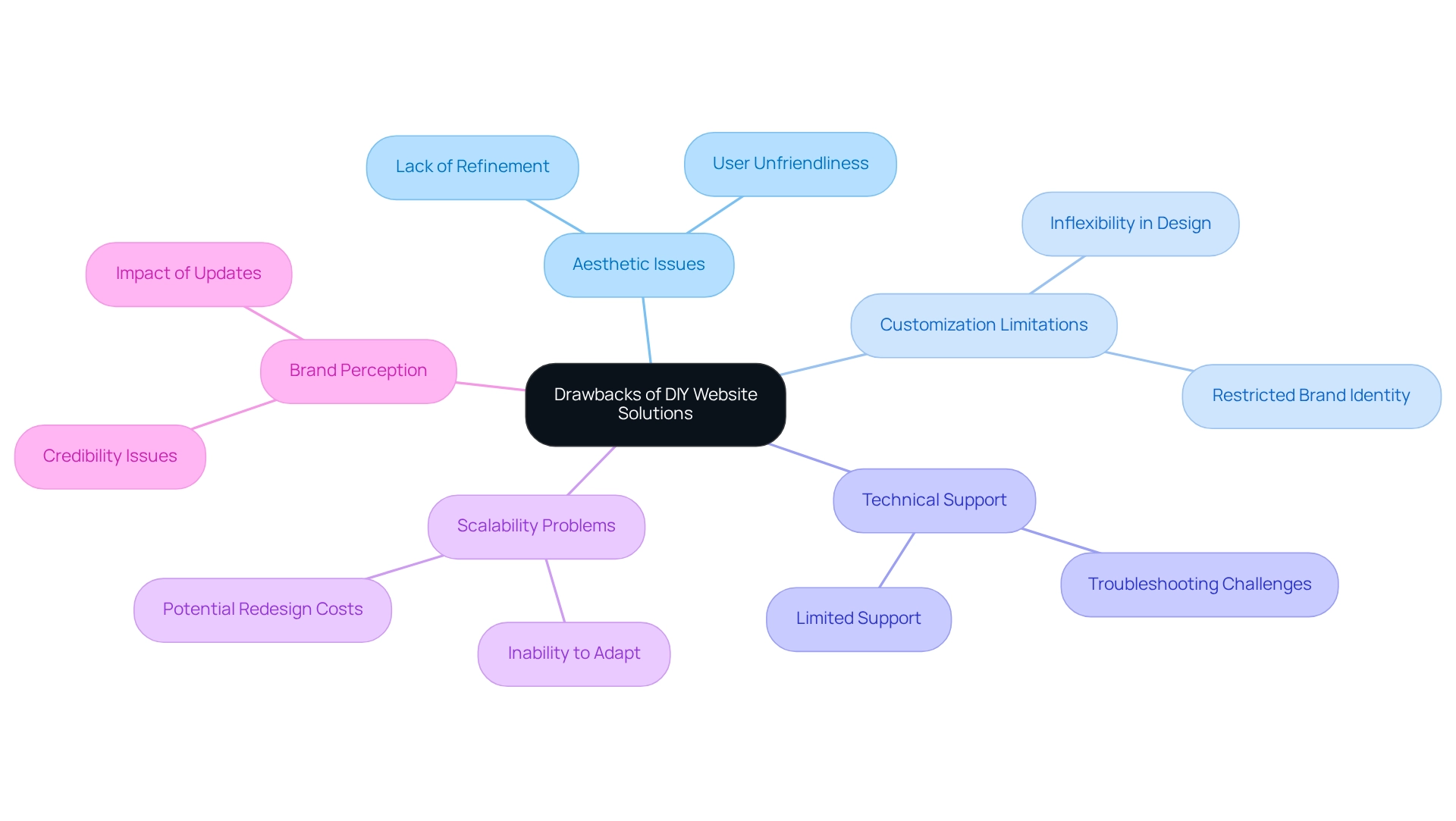Overview
In the journey of launching a startup, many founders find themselves at a crossroads: should they invest in professional website design companies or opt for DIY solutions? This dilemma is common, and it’s essential to recognize the emotional weight behind this decision.
On one hand, professional firms offer tailored services and ongoing support that can significantly enhance user engagement and conversion rates. However, the cost can be daunting, especially for those just starting out.
On the other hand, DIY solutions present a cost-effective and accessible option, yet they often come with limitations in design quality and technical support. These limitations can hinder long-term growth, leaving founders feeling overwhelmed and uncertain.
It’s crucial to acknowledge these pain points, as they reflect the real struggles of many in the tech startup community. Ultimately, the choice depends on balancing immediate needs with future aspirations. By understanding these dynamics, founders can make informed decisions that resonate with their vision and goals.
Remember, you’re not alone in this journey; seeking guidance can lead to a path of success and fulfillment.
Introduction
In today’s digital marketplace, startups find themselves at a crossroads: should they invest in professional web design services or take the do-it-yourself route? This decision can feel overwhelming, as both options come with their unique advantages and challenges.
- Professional web design companies provide tailored solutions that enhance user experience and foster engagement.
- DIY platforms offer an accessible and budget-friendly alternative for those who wish to maintain control over their online presence.
As you navigate this important choice, it’s crucial to understand the implications of each path. This understanding will help you establish a strong digital footprint that resonates with your target audience and supports sustainable growth. Remember, you’re not alone in this journey; many founders have faced similar dilemmas, and there are supportive resources available to guide you towards the best decision for your startup.
Comparing Professional Web Design Companies and DIY Solutions
Creating a strong online presence can feel overwhelming for new businesses, leading to a significant decision: should they hire a professional web development firm or opt for DIY online solutions? Professional website design companies, such as RNO1, provide tailored services that include branding, user experience (UX) design, and comprehensive digital marketing strategies specifically crafted for e-commerce. These firms not only deliver high-quality, customized creations but also ensure ongoing support, which is crucial for adapting to market changes and enhancing user engagement.
On the other hand, DIY options present a more accessible and budget-friendly alternative, allowing new businesses to utilize templates and tools to independently establish their online presence. While these options can be economical, they often come with limitations in design flexibility and technical support, potentially stunting a new business's growth.
Pros and Cons of Professional Web Development vs. DIY Solutions
Professional Web Development
- Pros: Tailored services, ongoing support, high-quality visuals, and expertise in e-commerce needs.
- Cons: Higher initial costs compared to DIY solutions.
DIY Solutions
- Pros: Cost-effective, easy to access, and allows for quick setup.
- Cons: Limited design flexibility, reduced technical support, and potential challenges in achieving a professional look.
Statistics reveal that a thoughtfully designed online platform can significantly enhance credibility and is vital for driving traffic and generating leads. In fact, new businesses investing in professional website creation often see improved user engagement and conversion rates. For instance, sites that load in under one second can experience a 4.6% increase in traffic, while those that take longer than three seconds risk losing a substantial number of visitors. Furthermore, industry insights underline the importance of professional services offered by website design companies for new businesses. Gabriel Shaoolian, CEO & Founder, notes that 38% of consumers are more inclined to purchase from businesses offering live chat support, highlighting the necessity of user-friendly features that foster customer engagement.
Ultimately, understanding the key differences between professional web development firms and DIY options is essential for new businesses. This knowledge empowers them to make informed choices that align with their growth aspirations, ensuring they cultivate a strong digital presence that resonates with their intended audience.
![]()
Benefits of Hiring a Web Design Company for Startups
For new businesses, collaborating with website design companies like RNO1 can be a game-changer. Many startups struggle with creating an impactful online presence, and this is where RNO1 stands out among website design companies as a Design Experience Partner. Their focus on aesthetics means that every interaction is thoughtfully crafted, significantly enhancing customer engagement.
A well-designed online platform from website design companies can lead to improved conversion rates; in fact, a survey revealed that 80.8% of online redesign projects were initiated due to low conversion rates. This underscores the importance of professional aesthetics in elevating business performance, and it emphasizes that website design companies like RNO1 provide comprehensive branding services, ensuring that your platform truly reflects your startup's identity and values. This alignment is essential for establishing a strong brand presence in a competitive landscape.
RNO1 has successfully partnered with clients like RentMethod and Spring Labs, driving scalable brand growth through innovative design strategies. Their expertise in advanced tools and technologies not only boosts online performance and SEO but also leads to increased traffic and conversions.
It's worth noting that 85% of shoppers make their purchasing decisions based on the quality of photos and product information on e-commerce websites, which highlights the critical need for website design companies to provide professional design. Additionally, it's concerning that 96% of users have encountered websites that aren’t optimized for mobile devices, which can severely hinder user experience and engagement.
RNO1 provides ongoing support and maintenance, employing tailored strategies to ensure that new businesses can concentrate on their core operations while their online visibility remains efficient and current. This strategic partnership not only enhances cost efficiency but also fosters continuous innovation, which is vital for new businesses looking to solidify their position in their industries.
Testimonials from emerging business leaders showcase the transformative impact of partnerships with website design companies on their branding and marketing effectiveness, illustrating the tangible benefits of such collaborations.

Challenges of Engaging a Web Design Company
Hiring website design companies can be a daunting task for new businesses, and it’s important to approach this challenge with care. One of the most pressing concerns is the expense; professional web development services can significantly impact a startup's budget, particularly in those early stages. While it’s possible to find online creation services for as little as $599 a month, startups must weigh this against their financial constraints and the potential return on investment. However, it’s essential to remember that choosing lower-cost options doesn’t always guarantee quality, which can ultimately affect the website's effectiveness.
The collaboration process with a design agency can also feel overwhelming. Startups often find themselves caught in lengthy communication cycles, which can lead to frustrating delays in project timelines. This challenge is compounded by the need to align the agency's vision with the unique nuances of the startup's industry, which can create misaligned expectations and outcomes. Data shows that project timelines can be unpredictable, further complicating the planning process for new enterprises.
Flexibility is yet another critical issue. Startups may struggle with how responsive external agencies are to shifts in market conditions or changes in business strategy. Relying on an outside firm can hinder a startup's ability to pivot quickly, which is often crucial in the fast-paced tech landscape.
Expert insights underscore the importance of investing in quality services offered by website design companies. As Joseph D'Souza, founder of a well-respected creative agency, puts it, "Businesses investing in quality web aesthetics are not just making their website appear attractive but also establishing trust, enhancing user experience, and ultimately boosting their opportunities for success online." Moreover, statistics reveal that companies focused on aesthetics see greater sales growth than those that overlook this aspect. For instance, 68% of businesses with a mobile-first approach reported a rise in sales, highlighting the tangible benefits of prioritizing effective web development. Additionally, 23.1% of web designers now favor voice user interface and search, indicating a trend that new businesses should consider when crafting their online presence.
In summary, while engaging website design companies can provide significant advantages, new businesses must navigate the complexities of cost, collaboration, and flexibility to ensure a successful partnership. Remember, you’re not alone in this journey; with the right support and understanding, you can find a path that leads to success.

Advantages of DIY Website Solutions for Startups
For many startups, particularly those operating on tight budgets, the journey can feel overwhelming. The challenge of establishing a digital presence often looms large, especially when technical expertise is lacking. Fortunately, DIY online solutions present a nurturing alternative, offering user-friendly interfaces and customizable templates that empower entrepreneurs to craft their websites without needing extensive technical know-how. This approach not only fosters greater control over the design process but also allows for quick updates as the business evolves.
Moreover, opting for DIY solutions can significantly alleviate financial strain, making them an appealing choice for new businesses looking to conserve resources. Many platforms also come equipped with integrated tools for SEO, analytics, and marketing, which can help startups manage their online presence more effectively. This flexibility is particularly beneficial for those still in the process of refining their brand identity and market strategy.
Recent data reveals a heartening trend: 32% of small enterprises are now utilizing DIY builder software. This shift highlights a growing recognition of the empowerment these platforms offer, allowing entrepreneurs to take charge of their digital footprint. Additionally, nearly half of small enterprises (46%) have internal staff overseeing their online platforms, underscoring the allure of DIY options for those who may not have significant resources at their disposal.
As new ventures navigate the complexities of establishing themselves in competitive markets, the ability to independently create and manage their online presence can indeed be a game-changer. This is especially true given the economic concerns many small business owners face. Embracing DIY solutions not only provides a sense of control but also fosters a supportive community of entrepreneurs who are navigating similar paths.

Drawbacks of DIY Website Solutions
While DIY online solutions may seem appealing for new businesses, they come with significant drawbacks that can hinder long-term success. One major concern is the absence of professional aesthetic skills, often resulting in platforms that lack refinement and user-friendliness. Research shows that 95% of users agree that a positive user experience is essential, underscoring the importance of expert contributions in establishing a successful online presence.
Moreover, the customization options available in DIY platforms are frequently limited, which can restrict a new business's ability to forge a unique brand identity. This limitation can be particularly damaging in competitive markets where differentiation is crucial. Additionally, technical issues are common with DIY solutions, as these platforms typically do not offer the same level of support and troubleshooting that a specialized agency would provide.
As new ventures grow, their website needs often evolve. Unfortunately, many DIY solutions lack the scalability necessary to adapt to these changing requirements, potentially resulting in a complete redesign down the line. This not only negates any initial cost savings but also disrupts business continuity. Startups that depend on DIY solutions may find it challenging to meet the demands of an increasingly mobile user base, further complicating their growth journey.
Expert insights shed light on the limitations of DIY platforms. Web development professionals note that credibility is significantly enhanced by websites that appear consistently updated or evaluated—a quality that DIY solutions may struggle to provide. As startups explore their options, it is vital to consider these factors thoughtfully, as the initial allure of DIY solutions can lead to long-term challenges that affect growth and brand perception. RNO1's successful partnerships illustrate the transformative power of professional design, making a compelling case for investing in website design companies.

Conclusion
Establishing a strong online presence can feel overwhelming for startups. The choice between professional web design services and DIY solutions often weighs heavily on founders. Professional web design companies bring tailored expertise that significantly enhances user experience, fosters engagement, and ultimately drives conversions. With ongoing support and advanced tools, these firms ensure that a startup's digital footprint is not only attractive but also functional and adaptable to market changes.
On the other hand, DIY solutions present an accessible and cost-effective alternative, allowing startups to maintain control over their websites. This approach enables quick setup and immediate changes, yet it often falls short in design quality, technical support, and scalability. Many startups discover that the initial savings may lead to long-term trade-offs, as the absence of professional input can stifle growth and brand differentiation.
The key takeaway is that each option carries its own merits and challenges. Startups must thoughtfully evaluate their unique needs, budget constraints, and long-term goals. Investing in professional web design can yield significant advantages in credibility and user engagement, while DIY solutions may serve as a temporary fix that requires reconsideration as the business evolves. Ultimately, making an informed decision will lay the groundwork for a robust digital presence that resonates with target audiences and supports sustainable growth. Remember, you are not alone in this journey; many have faced similar choices, and the right support can make all the difference.
Frequently Asked Questions
What are the main considerations for new businesses when deciding between professional web design companies and DIY solutions?
New businesses must consider factors such as the quality of design, ongoing support, cost, and the ability to create a strong online presence. Professional web design companies offer tailored services and expertise, while DIY solutions are more budget-friendly but may lack flexibility and support.
What are the pros and cons of hiring a professional web development firm?
Pros: Tailored services, ongoing support, high-quality visuals, and expertise in e-commerce needs. Cons: Higher initial costs compared to DIY solutions.
What are the advantages and disadvantages of DIY web design solutions?
Pros: Cost-effective, easy to access, and allows for quick setup. Cons: Limited design flexibility, reduced technical support, and potential challenges in achieving a professional look.
How does website design impact user engagement and conversion rates?
A well-designed website can significantly enhance credibility and drive traffic. For example, sites that load in under one second can see a 4.6% increase in traffic, while slower-loading sites risk losing visitors. Moreover, 80.8% of online redesign projects are initiated due to low conversion rates.
Why is it important for startups to invest in professional web design?
Professional web design helps establish a strong brand presence, improves conversion rates, and ensures that the website reflects the startup's identity. It also provides ongoing support and maintenance, allowing businesses to focus on core operations.
What statistics highlight the need for professional web design?
Key statistics include that 85% of shoppers make purchasing decisions based on the quality of photos and product information, and 96% of users have encountered websites that aren’t optimized for mobile devices, which can hinder user experience.
How can partnering with a web design company like RNO1 benefit startups?
RNO1 offers comprehensive branding services, innovative design strategies, and ongoing support, which can enhance online performance, boost traffic and conversions, and foster continuous innovation for new businesses.
What role does user-friendly features play in customer engagement?
User-friendly features, such as live chat support, are crucial for customer engagement. According to industry insights, 38% of consumers are more likely to purchase from businesses that offer these features.




